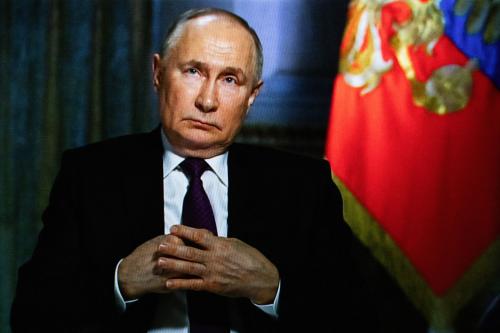Hillary Rodham Clinton (D-NY) today criticized the Bush administration’s “go it alone” and “schizophrenic” foreign policy, saying that “no nation can continue to march to the tune of their own drummer—that’s not a parade, it’s more of a gang plank.”
Clinton, in a speech delivered at the Brookings Institution, described how her recent visits to Afghanistan and Iraq, as well as her experience on the Senate’s Armed Services Committee, have shaped her views on fighting terror and preventing the spread of weapons of mass destruction. She spent this past Thanksgiving visiting troops in both Afghanistan and Iraq. Although she supported U.S. military efforts in both countries and voted for additional appropriations for the reconstruction of Iraq, Clinton has been a vocal critic of the Bush administration’s approach to foreign policy.
“In the lead up to the war in Iraq, the administration choose to ignore many allies and the United Nations,” said Clinton, who strongly favors a more multilateral strategy. “Has the administration come to understand that the fifty year bipartisan consensus supporting multilateralism was not an excuse for weakness, but rather, an exercise of strength?”
Clinton was troubled by the diminished standing and reputation of the United States in the eyes of the global community, and believes that the Bush administration has helped worsen international relations by adopting a “laissez-faire” approach in the Middle East and pulling out of various international agreements, including the Kyoto Protocol, the ABM Treaty, and the Comprehensive Test Ban Treaty. She cited interventions in Kosovo and the Balkans as examples of successful multilateral efforts.
Addressing recent administration and U.N. deliberations over the transfer of political authority in Iraq and the establishment of a new Iraqi national government, Clinton urged the administration to extend the June 30 deadline for at least a few months in order to assure a more peaceful transition. Clinton cited unanswered questions about the nature of the eventual Iraqi government, notably the importance of striking a balance between competing impulses: religious and secular, federal and region.
“We have a date, but not a destination,” said Clinton. “We should not adhere slavishly to an artificial deadline if it creates chaos and unraveling in Iraq.”
Clinton also discussed the ongoing war on terror and criticized the Bush administration’s “flawed strategy” going into Iraq.
“The CIA, the State Department, and think tanks in this town all predicted the problems we are now witnessing in Iraq.” Although she applauded the president’s decision to look into Iraq intelligence failures by appointing an investigatory panel, she questioned Bush’s appointment of retired judge Laurence Silberman (a veteran of the Nixon and Reagan administrations who has strong ties to Vice President Dick Cheney), and the fact that the panel won’t release it findings until March of 2005—well after the upcoming presidential election.
“The approach chosen by Bush could lead to the impression that [the panel is] less interested in looking for answers and more interested in providing excuses,” Clinton said.
Clinton said that U.S. intelligence efforts could be strengthened by expanding the Nunn-Lugar Act—a law enacted in 1991 that aimed to prevent nuclear weapons from the former Soviet Union from falling into the hands of terrorists or rogue states—to cover other trouble areas.
“It could do even more if we expanded it,” Clinton said. However, “efforts to do so have been rebuffed at every time.” Clinton noted that the administration’s most recent budget reduces funding for Nunn-Lugar by 10 percent.
Clinton said that the war on terrorism cannot be exclusively fought with military might, and the administration would be wise to pay more attention to winning over the “hearts and minds” of people around the world. She called for the additional funding of development programs, including the Millennium Challenge Account, global education efforts, and HIV/AIDS assistance, especially in China, Russia, and India. “We are missing the boat” in those areas, Clinton said.
Clinton also called on President Bush to issue a statement regarding women’s rights in both Afghanistan and Iraq. During her visits to those countries, Clinton was “deeply troubled” by restrictions being imposed on women, saying that the daily reality for most women was not as liberating as politicians have suggested.
Despite the continuing challenges facing the United States, Clinton remained optimistic. “We do face new forces that threaten to undermine our very way of life, but we can confidently meet these threats and make the country and the world stronger in doing so.”



Commentary
Op-edEvent Summary: Fighting Terror and the Spread of Weapons of Mass Destruction
February 25, 2004